- Home
- P. T. Deutermann
Nightwalkers cr-4
Nightwalkers cr-4 Read online
Nightwalkers
( Cam Richter - 4 )
P T Deutermann
Nightwalkers
P. T. Deutermann
APRIL 1865
They came out of the darkness, riding lean, hungry horses. The engineer put down his unlit pipe and reached for the shotgun in the cab, but then relaxed. The riders were Reb cavalry, not goddamned bluecoats. He could tell by their slouch hats, the mishmash of uniforms and weapons, and those big CS belt buckles gleaming in the engine's headlight. The officer who appeared to be in charge rode right up to the locomotive. The others slowed to a walk and spread out in a fan around the train's guard detail, who were lounging in the grass beside the tracks while the engine took on water. The riders were greeting the men with soft drawls and questions about what was going on up there in Richmond city.
The officer wore the insignia of a major, and he tipped his hat to the engineer with his left hand while holding the reins close down to the saddle with his right. He was wearing a dirty white duster that concealed the lower half of his body.
"Major Prentice Lambert, at your service, suh," he declared. He had a hard, hatchet-shaped face with black eyes and fierce eyebrows. "This the documents train?"
The engineer said yes, a little surprised that the major knew. There were only four cars behind the engine and its tender, three of them passenger cars stuffed to the windows with boxes of official records from the various government departments up in Richmond. The twenty-man guard detail rode in the fourth car, but they were all disembarked for a smoke break and calls of nature. The guards, who were an odd mixture of old men, teenagers, and even some walking wounded from the trenches at Petersburg, seemed relieved to see Confederate cavalry.
The major nodded, as if the engineer's answer were hugely significant. The engine puffed a shot of steam from the driver cylinder, spooking the major's horse sideways, but his rider held him firmly.
"Any more trains behind you?" the major asked, shifting his reins to his left hand as the horse danced around.
The engineer shook his head. "We heard ol' Jeff Davis took one south two nights ago, but ain't nothin' comin' down thisaway that I know of. Jig's 'bout up in Richmond."
"All right, then," the major said. He raised the big Colt Dragoon he'd been holding down beside his saddle horn, pointed it at the engineer's belly, and fired.
The engineer sat down hard on the steel grate of the engine cab, the wind knocked clean out of him and this awful, ripping feeling in his guts. He grasped his midsection with both hands and felt the blood streaming. He was dimly aware of more shooting now, as that arc of cavalrymen also opened fire, shooting down the stunned soldiers where they sat in the grass or leaned against trees, all their weapons still back on the train. He bent over to look down at his middle, lost his balance, tumbled off the engine steps onto the cinder bed, and then rolled into the grass. His knees stung where he'd hit the track bed, but then that pain faded and he relaxed into the sweet feel of that long, cool grass against his cheek. His middle was going cold now, and his legs were buzzing with pins and needles.
He looked back up at the train, his vision shrinking into a redhazed tunnel. He saw a single white face at the nearest window in the front car, a young face, no more than a kid, maybe fifteen, sixteen. One of the guards? He tasted salt in the back of his throat, and it was becoming really hard to get a breath of air.
Why hadn't that kid gotten off the train? What was he doing in there among all those boxes, while his comrades outside were being slaughtered like beeves?
One of the horsemen saw the kid's face and surged his horse forward, his black cap-and-ball pistol pointing at the window. The engineer heard the major's voice call out, "No. Not him. Leave that one be."
The horseman reined up. "That's your spy? That boy?"
"Train was right here when it was supposed to be, weren't it?"
"Yeah, but you said, now. No goddamned witnesses."
"There won't be," the major said, getting down off his horse, "but I need to know one more thing."
Then the engineer heard the other horseman swear. He realized he'd been spotted, eavesdropping on their conversation. He tried to crawl up the bank, trying to get under the locomotive, but his limbs had turned to rubber. He thought he heard the major say, "Oh, goddammit," and then a bolt of lightning exploded in his head and he was gone to see the Baby Jesus.
THE PRESENT
Right here's where it happened," the Realtor said, puffing a little as we climbed the embankment to the abandoned railroad line. "April 4th, 1865. Right up here. About an hour after sundown."
It was an early spring day, and the faded right-of-way pointed down to the Dan River on my right. The rails and ties were long gone. All that remained of the nineteenth-century trestle was the stone abutments on both sides of the river and the stumps of pylons out in the current. The abutment on the Carolina side was fortified, complete with a tower for sharpshooters and two pads for cannons. On the Virginia side the abutment was a plain stone wall. Beyond it stood a dense grove of what the Carolina locals called Virginia pines, supervised by a few ancient, lightning-bit oaks.
"They waited over there, in those woods," he said, pointing to our left, where the rail line bent around the base of a small hill and then disappeared into a notch in the woods. "This was a waterin' stop-see that iron tower?"
A four-legged, rusting steel structure crouched to our left. At its base were the remains of a barrel-shaped water tank, perhaps ten feet in diameter. The wooden staves were gone, but the hoops and bands were still there.
"The locomotives would stop under that tower and lower a water hose into the tender. That's what they were doin' when them bastards rode out of those woods yonder and started shootin'. They caught the guards with their pants down, some of them literally so."
"They were after gold?"
He frowned. "That gets a little fuzzy, history-wise," he said. "Supposedly the train was carryin' important documents, government records and such. It could have been carryin' part of the Confederate treasury, but ol' Jeff Davis had already come through with the bulk of it, on his way to gettin' caught wearin' a dress down in Georgia. Even so, yeah, most folks think there was gold behind what happened here."
I'd heard the story when I first started looking at the property, two months back. The plantation was called Glory's End, a seven-hundred-acre cotton and tobacco farm in Rockwell County, northeast of Triboro. One of the disclosure elements was that there were two graveyards on the property, one dating back to the end of the Civil War, the other lost on the property somewhere.
"They kill all the guards?"
"They killed everybody, guards, train crew, the lot. Just shot 'em down. Local folks heard all the shootin', but they was afraid to come out in the dark. Next mornin' they found the train sittin' right here, the firebox gone out, and all those boys stiffened up on the ground. Musta been a helluva sight, you know?"
"Most battlefields are," I said.
"Wasn't no battle here," he said with a sniff. "This here was murder, plain and simple. Buncha cavalry deserters from Georgia who knew somethin' they shouldn'ta. Wasn't leavin' any witnesses, neither. The railroad company carried off the train crew that day. Rest of 'em are all buried yonder, on that hill."
"I want to see that," I said.
"Ain't much to see," he said, eyeing the hill warily. Mr. David Oatley was a portly individual and apparently wary of hills. "Ticks'll be comin' out, you know."
"Still," I said.
"Right," he said. We crossed the overgrown right-of-way, stumbled down the gravel embankment on the other side, and walked up into the knee-high grass.
The graveyard was a collection of rectangular stone markers and stumpy white tombstones. A few we
re formally inscribed; others were just plain rocks with one smooth face bearing a name and life dates. Many of the markers were flat on the ground, and there was no fence or other enclosure. I counted twenty-nine graves that I could see. Wild cedars had sprung up everywhere over the years, now standing sentry duty over the remains of the slain guards. Mr. Oatley wiped his face with a handkerchief and pulled up a pant leg to see if he'd acquired any passengers.
"These are Confederate war dead," I said. "How come this place isn't state maintained?"
"They was ashamed, I reckon. This was gray killin' on gray, you know? The government up in Richmond had pretty much gone down, Grant had Lee's army by the throat over near Appomattox, lotta folks was runnin' for their lives. That's how the property got its new name, by the by. Used to be called Oak Grove. After this mess, right here, that's when they called it Glory's End."
"Highly appropriate, too," I said. I'd been moving closer to a decision about buying this property for some time now, ever since learning that it might be available. Surveying this poignant piece of history, I made up my mind.
"Okay. I'll buy it."
Mr. Oatley's perspiring face broke into a big smile. "Wonderful, sir. That's wonderful. You won't regret it, I can promise you that."
We drove back to town in his SUV. I'd already done quite a bit of research on the property before actually approaching a Realtor, including a flyover in a small plane for an aerial look. The plantation had just over a mile of river frontage on the Dan, five miles of road frontage on a two-lane highway, and about four hundred acres of rolling land laid out in abandoned crop fields and woods. The remaining three hundred acres was in forest. It was commonly stated that none of the prominent families in Rockwell County "ever" sold big parcels, but apparently their heirs did. The elderly lady who'd owned Glory's End had died the previous fall, and the two surviving "children," both in their sixties, had let the local Realtors know that they might be persuaded, reluctantly, of course, most reluctantly, to let it go for two point five mil to the right kind of people.
Besides the tragic history, the most interesting feature for me was the original plantation house, a redbrick, white-columned pile overlooking a long sweep of cleared ground down to the river bottoms. It dated from the 1830s or so, when Rockwell County was the single most prosperous county in North Carolina, supported, of course, by a slave-based labor force. It wasn't a huge building, as the real ones often weren't, but it was pretty much in its original configuration. There were none of the blighting additions I'd seen tacked on to other nineteenth-century houses in the area. I intended to restore it and then live in it.
My crew of retired cops at Hide and Seek Investigations, all city boys at heart, thought I'd gone senile. One of them even bought me a video of that movie The Money Pit just to make sure I knew what I was getting into. For me, however, it was time to make a change. I was tired of living in the ever-expanding suburban densepacks of the Triboro area. The peaceful old farm behind my house had been acquired by a developer, so now I got to watch them rape the hillside with giant yellow machinery in preparation for yet another mansion graveyard of million-dollar homes, shoddily built by heavily leveraged builders, a whopping twenty-five feet between them. I had known that all this was inevitable, so I'd been looking for some country property for a year or so before the big Caterpillars showed up.
I was also getting bored with herding court papers and the general tedium of missing persons cases that were the bread-and-butter jobs for our little company. There were some really interesting cases, but for the most part we chased down people who didn't want to be found and served them with paper they didn't want to see. When I sensed that I was getting on my guys' nerves, I decided that I needed a change of scene and a project. Glory's End looked like it would do.
We did the necessary preliminary paperwork, and I gave Mr. Oatley my banker's name and number to begin the money dance. His eyes really lit up when I said there would not be a mortgage. I did want a title search, a survey bring-up, and all the other usual due diligence normally required by a bank. He thought we could probably close in thirty to sixty days, barring complications. I asked what kind of complications.
"This is an old, rural county, Lieutenant," he said solemnly. "Titles can be complicated, depending on how far back they go and how long a family has owned it."
"Shouldn't that actually simplify it?"
"In the early days," he said, "the big cotton and tobacco planters would work the ground until it was exhausted. Then they'd abandon it and move on to new ground. Technically they still owned it, but if some small farmers moved in behind them, things could get murky."
"Well, time I've got," I said, "and, of course, the money to buy it."
"That should help considerably," he said, rubbing his hands together.
"One more thing," I said. "I would like permission to stay at the house from time to time. I'll rent it if that's what it takes."
"I'm sure that can be arranged," he said.
I drove back to my office downtown, where Pardee Bell told me there was an urgent message from a Mr. Ray Garrett.
"Dude says he's the TPC at Alexander state prison."
"What's a TPC?" I asked. Pardee had no idea.
I went down to my office and called Mr. Garrett. "Okay," I said, when he answered. "What's a TPC?"
"Transition placement coordinator," he said with a chuckle. "The new and improved name for the prisoner release paperwork guy. I started as a main pop screw, but now I've moved up to upper middle corrections management. Ain't that something?"
I agreed that it was most impressive and asked what was up.
"Back when you were on the job there with the Manceford County Sheriff's Office, do you remember sending up a bad boy named Breen? Billie Ray Breen?"
I searched my memory. "Yeah," I said. "Nasty little bastard. Got drunk, got mad, beat his common-law wife and her sister almost to death with a baseball bat one night. Gorped the sister, as I remember. The wife had to testify by blinking her one good eye yes or no. We took him down in some no-tell motel that same night with the MCAT. Crack-thin kid, rat faced, weird eyes."
"Well," he said, "that still describes him. He's done twelve on a twenty-to-life jolt in the red level here. That's the good news."
"Okay, and?"
"The bad news is he's getting early-released."
"How in the hell did that happen?"
"Don't ask, Lieutenant. Here's the thing: I think you're getting a ghost."
Oh, great, I thought. In cop parlance, a ghost was someone who got out of prison and then went after the cop who put him in. When I said we took him down, I should have said that I had personally taken him down when he shot one of my guys and tried really hard to shoot me. I'd put one through his right lung and two more into his plumbing, but, unfortunately, we were issued nines in those days, and, thin as he'd been, he'd survived, after soaking up a great deal of the taxpayers' money.
"He been talking trash?"
"Not so's we could bust him for it," he said, "but we have ears out there. Word is that he's gonna make you, by name, his new life's work."
"When exactly does he get out?"
He named the date.
"Parole supervision?"
"Three years, minimum. I'll get you his PO's name as soon as one's assigned. Since he was red level, it'll be weekly at first."
"Let's tell him I retired in Europe."
"Wish I could, but I'm betting he can find you the same way I did."
"Which was?"
"Called the Manceford County Sheriff's Office. They gave me your business number. I looked up the number on the Web, and Grandma Google told me everything else I needed to know. Your company. Your bio. Home number and address. Old news stories. A picture even. They call it progress, Lieutenant."
"Yeah, really," I said. "Well, I appreciate the heads-up. Maybe I should just wait out in the parking lot and mash him with my pickup truck when he comes through the gates."
"Then
you'd take his place in here, Lieutenant. Trust me, you wouldn't like it."
I thanked him again, hung up, and went to get some coffee. All cops, especially retired cops, lived with this possibility. Bad guys locked up for years on end had plenty of time to stew up notions of revenge on the cop who'd put them away. Their being in prison was, of course, never their own fault, and, once out, they usually had nothing else to do, life having passed them by in terms of skills or capability. That meant they could be very dangerous.
I briefed my guys, who were all ex-cops. Tony Martinelli, Pardee Bell, and Horace Stackpole had all served on the MCAT with me back in the day. Now we worked court papers, found witnesses, and tagged the occasional philandering husband. I owned the company, and we all worked as much or as little as we wanted to. I didn't need the money, and the other guys were mostly filling up 401(k)s and staying out of their respective wives' hair.
"No problem, boss," Tony said. "You tell us who his PO is and we'll find a way to violate his ass right back to Alex."
Sounded like a plan to me.
I went out the next day to walk the property again, this time without the Realtor. I did take my two operational German shepherds, Frick and Kitty. Both were sable females. Frick was older and a bit smaller than Kitty, but they complemented each other nicely in the field. Frick was a busybody with an excellent nose who tended to scout ahead, while Kitty, with her strong sense of duty, stayed back with me at all times. The third member of my shepherd family, Frack, was a stay-at-home dog now, after losing a leg and an eye in the moonpool case. He was even older than Frick, and the role of senior citizen seemed to suit him just fine. As with too many aging German shepherds, his back end wasn't going to last much longer anyway. I dreaded that day, because when their wheels fall off, you have to do your duty.
The plantation's main driveway was a mixture of gravel and truly determined weeds. There were two brick gate pillars leaning at odd angles just inside the turnoff from the main road. One had a date inscribed, 1838, and the other the plantation's name, Glory's End. The numerals, antique characters partly obscured by ivy, were only faintly visible. The name's lettering, however, looked newer, which matched with the story of the name change at the end of the Civil War. As I turned into the drive I caught a glimpse of an even bigger house across the road behind its own aisle of oaks. David Oatley had told me that the neighboring plantation was called Laurel Grove and that the people who had built Glory's End had been related to the people across the road. I couldn't tell whether anyone was home, but the grounds did look maintained. Mr. Oatley had said the folks were eccentric, devoted to the past, and reclusive.

 The Nugget
The Nugget The Hooligans
The Hooligans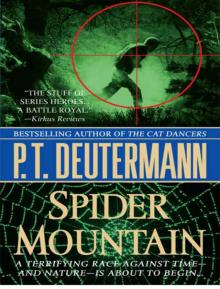 SPIDER MOUNTAIN
SPIDER MOUNTAIN![Cold Frame [retail] Read online](http://i1.bookreadfree.com/i/03/19/cold_frame_retail_preview.jpg) Cold Frame [retail]
Cold Frame [retail] Sweepers
Sweepers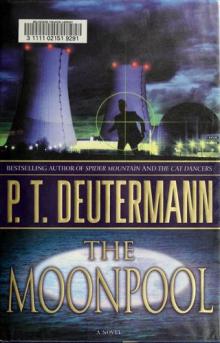 Cam - 03 - The Moonpool
Cam - 03 - The Moonpool Trial by Fire
Trial by Fire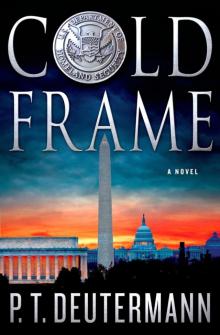 Cold Frame
Cold Frame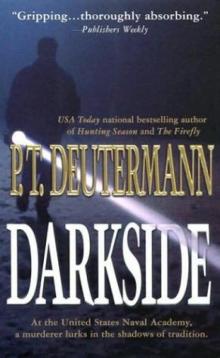 Darkside
Darkside Cam - 04 - Nightwalkers
Cam - 04 - Nightwalkers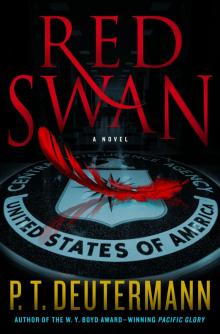 Red Swan
Red Swan The Commodore
The Commodore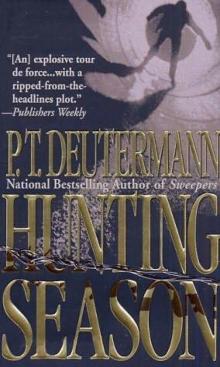 Hunting Season
Hunting Season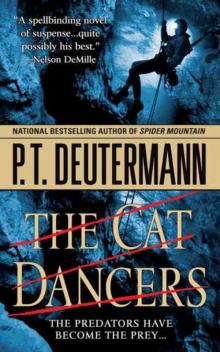 The Cat Dancers
The Cat Dancers Scorpion in the Sea
Scorpion in the Sea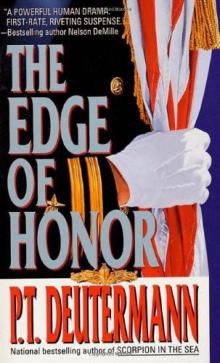 The Edge of Honor
The Edge of Honor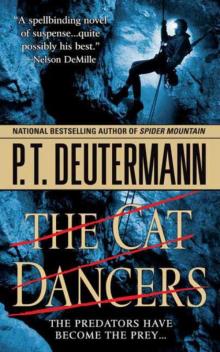 The Cat Dancers cr-1
The Cat Dancers cr-1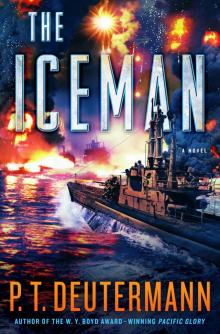 The Iceman
The Iceman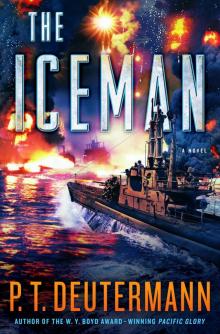 The Iceman_A Novel
The Iceman_A Novel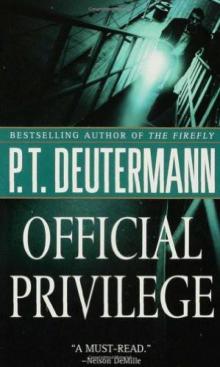 Official Privilege
Official Privilege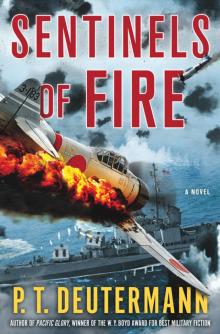 Sentinels of Fire
Sentinels of Fire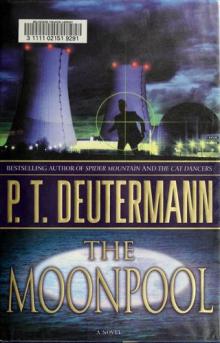 The Moonpool cr-3
The Moonpool cr-3 Nightwalkers cr-4
Nightwalkers cr-4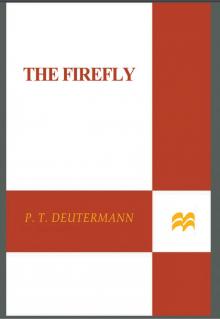 The Firefly
The Firefly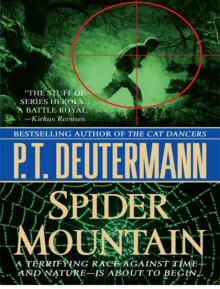 Spider mountain cr-2
Spider mountain cr-2 Pacific Glory
Pacific Glory The Last Man
The Last Man